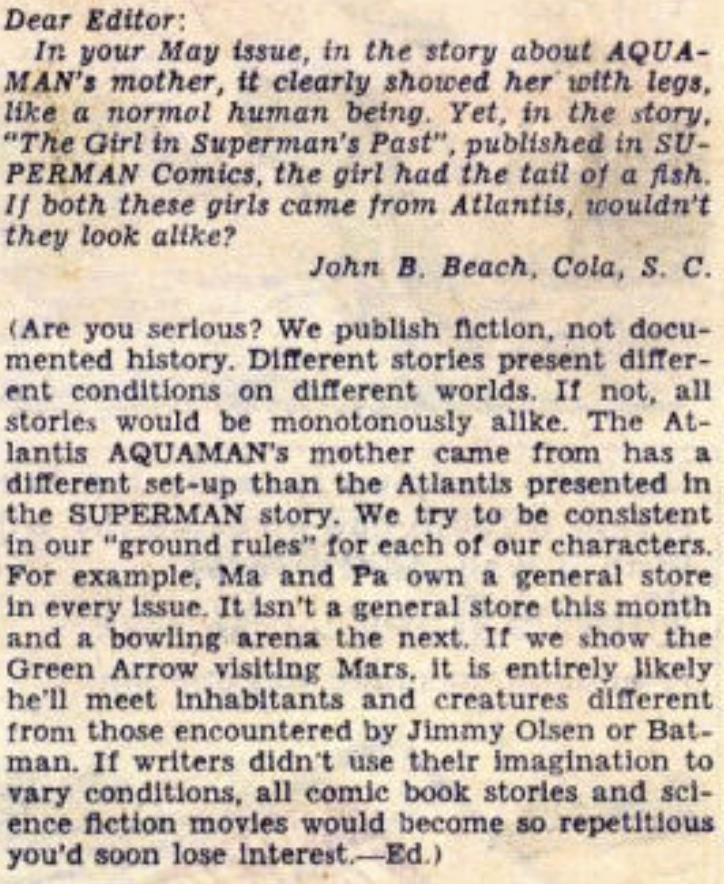In Adventure Comics #264 (July 1959), reader John B. Beach questions why Aquaman’s Atlanteans have legs while Lori Lemaris’ Atlanteans have fish tails. It’s a pretty decent question, given DC already announced that Superman and Aquaman share the same universe (the story has not been published yet though).
I thought the response from DC’s editor was pretty interesting:
“Are you serious? We publish fiction, not documented history. Different stories present different conditions on different worlds. If not, all stories would be monotonously alike… If writers didn’t use their imagination to vary conditions, all comic book stories and science fiction movies would become so repetitious you’d soon lose interest.”
Julius Schwartz’ response to why Atlanteans look different with different DC characters, Adventure Comics #264.
You can almost see the dawning realization in Schwartz’ response of what he has created. The introduction of the letters page actually led to this tension between readers and creators. Giving readers a place to question slip-ups and goofs on the writers parts, with editors giving clever explanations, created a feedback loop that led to smarter stories and sharper readers. It also seeded the ground for new story ideas, crossovers with characters, team-ups, etc.
Within a few years, Marvel would demonstrate that a consistent world of inter-connected characters and events, despite being a massive coordination of effort, is actually a drawing force for readers who love to nerd out about stuff like this. DC eventually came to realize this too around the same time with several ret-cons of their own to try to establish consistency. Interestingly, the seemingly simple concept of DC’s multiverse (starting with the Flash) ultimately led to never-ending publisher-wide crossover events like Crisis on Infinite Earths to reboot histories and universes and try to resolve conflicts in histories.
The inter-connectedness of these massive bodies of intellectual property pervaded film and video too, resulting in things like 1990s DC Animated Universe, 2010s CW’s Arrowverse and the Marvel Cinematic Universe. Mirroring the comics of the 1960s, Marvel’s TV and films have been more-or-less consistent since around 2008, modulo a few rights to characters that were licensed outside of Marvel Studios (and Spider-Man: No Way Home has smoothed over a bit more now). Unfortunately once again, DC can’t seem to get their act together (or instinctively adopted Julius Schwartz’ philosophy from the 1950s) resulting in several TV shows and films of differing continuities loosely explained in some contexts as a multiverse. I guess when there’s so much money to be made, the effort to maintain continuity just wasn’t worth it for them.
I was impressed with DC’s willingness to allow Ezra Miller’s film version of the Flash to be part of the TV Flash’s crossover event though! I wonder if The Flash (2022) will do the same and acknowledge those TV shows? Will Grant Gustin appear in the 2022 film?
